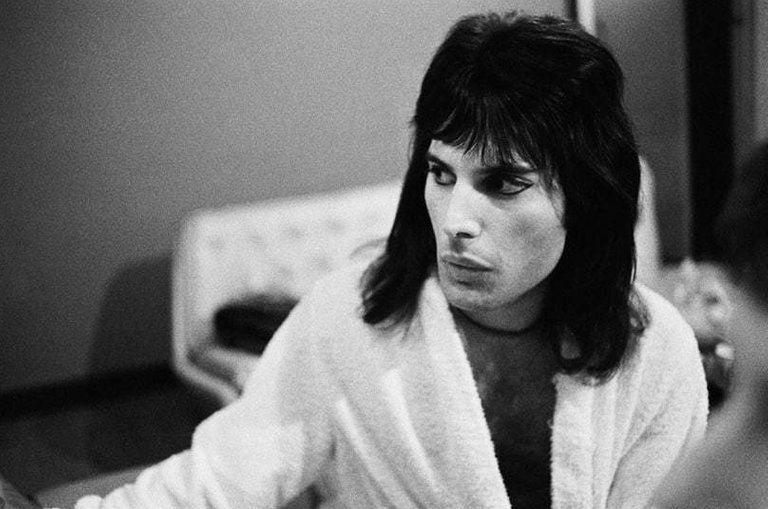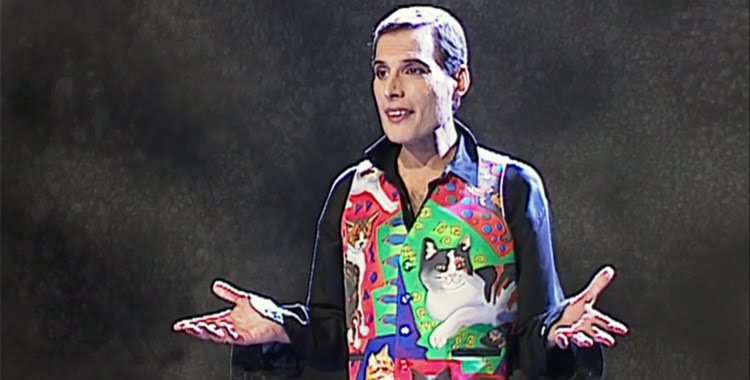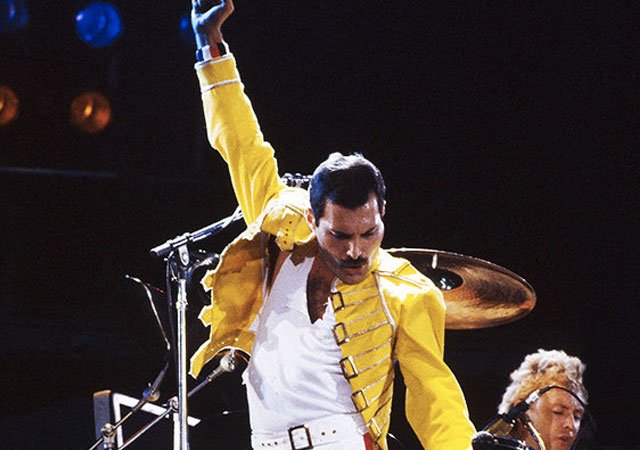
Twenty-six years since the physical disappearance of the most incredible voices in history, on November 23, 1991, Freddy Mercury verbalized something that many intuited. He did so with a press release with which he went from being the best rock singers in history to becoming a benchmark in the fight against HIV. "Responding to the information and the conjectures about me that have appeared in the press for two weeks, I want to confirm that it has been positive for the virus and that I have the syndrome, it's time for my friends and my fans to be close. The truth, and I hope that everyone will join me, my doctors and all who suffer this terrible disease to fight against it, "explained the singer through his spokeswoman Roxy Meade.
It was the first time that a star admitted to suffer this disease at the height of his career, at least in front of his audience that did not know his real state, but also the confusion that forever changed the public perception of a pandemic. that, until then, almost nobody looked at the face. "My intimacy has always been something special for me and I know the few interviews I give, understand that this pattern will continue, said Mercury to solve the problem, and a day later, on November 24, 1991, he died. done in silence, but his bravery inspired many kilometers of patients who refused to continue living in shame, ashamed of something that was not their fault.
Because we must not forget that today the fight against SIDA is something capable of gathering great names in pompous galas to raise funds. But in the early nineties, society was not so tolerant or so open. In fact, the trigger of Freddy's announcement had been the harassment of several British tabloids, who had published a handful of photographs that showed the extreme thinness and illness of the singer. Symptoms that Mercury had been busy hiding with makeup and lighting tricks in his last appearances.
He did it, for example, on May 30 of that same year, when he recorded These are the days of our lives, which would be his last videoclip, in black and white to hide the pallor and ulcers of his skin. A song that was part of the album Innuendo, whose lyrics already pointed to an imminent disappearance of the band and that contained the premonitory song The Show Must Go On that, as later assured its inner circle, reflected the mood of the last Mercury days.

It should not have been easy for Freddy to accept that the show should continue when he disappeared. That statement in which he admitted his illness was a coming out of the closet that had cost him his entire life and had probably tormented him since Easter 1987 when, shocked by the death of two of his former lovers because of AIDS, He decided to take the tests that confirmed his infection. In 1991, he had spent almost three years in his Kensington Garden Lodge residence, where he introduced drugs with total secrecy so that no one would suspect his treatment. But before I enjoyed a busy existence. Far away were those meetings that he organized with names like 'Saturday night in Sodom' where hermaphroditic dwarfs carried silver trays with a good assortment of drugs on their heads.
Upon hearing the news, Mercury only entrusted his HIV status to three people: his partner, the hairdresser Jim Hutton, who would accompany him until his death; his ex-girlfriend of youth and perpetual friend, Mary Austin, to whom he left in inheritance a large part of his fortune including the copyright of his songs and for whom he composed Love of my life; and Queen's manager, Jim Beach.
Some time later, the singer, forced by circumstances, shared it with the rest of the band. Not in vain, Brian May and company had to agree not to tour after publishing The Miracle (1989) and tried to take iron to the suspicions of the press. A means of communication that, to be honest, had respected until then quite the figure of Mercury. Although it was already drawn as one of the homosexual icons of the eighties, they never focused on their gay status.

THE SILENCE OF A SECRET
Neither was necessary. The repercussion of his musical work was always much greater than the details of his sexual life. Even today it is difficult to find someone who is not able to hum at least the chorus of hits like We will rock you, We are the Champions or Do not Stop Me Now.
It is no coincidence that the Official Charts Company, the official list of UK records, confirmed this year that the Greatest Hits released by Queen in 1981 has been the best-selling album of all time in the United Kingdom. The first and only one to sell six million copies.
In front of Queen, Freddie Mercury was also the master of arena rock, a term coined in the seventies to refer to concerts on gigantic stages before real crowds that today so well take advantage of bands like Coldplay, U2 or soloists such as Bruce Springsteen and Madonna. Although not only aroused admiration among the audience that packed their shows, but also colleagues who continued to honor his figure even after his death. David Bowie, for example, was fascinated with his theatricality. Kurt Cobain acknowledged that he listened to Queen in a sick way during the first Nirvana tour. And Lady Gaga, whose name pays homage to the Radio Gaga song and the singer himself, has always defined Mercury as an "emblem of freedom".
This is why Mercury never had to use his sexuality to sell more albums. Quite the contrary. Yes, Freddie indulged in certain mischiefs such as taking on the role of a housewife with a vacuum in I Want to Break Free or playing the misunderstanding by posing as actress Kim Novak, whose name he used to record his rooms on tours with Queen. He also enjoyed including subliminal and most autobiographical messages such as when in Bohemian Rapsody he killed his straight face and pointed to a silhouette in heels as his new self. But he never crossed the line.
The closest he got was in a 1974 interview with NME magazine in which he did not deny being bisexual. "Labels confuse, I slip," he said once. But they did not do so much and rejected on three occasions the offer of Richard O'Brien, director of the theatrical production of Rocky Horror Picture Show, to play Doctor Frank'n'furter. That seemed incompatible with other behaviors like hiding from his parents all the relationships he had with men during his adult life. The latter could be because of their religious convictions. Both he and his parents practiced Zoroastrianism, a philosophy based on the teachings of the Iranian prophet and reformer Zarathustra. Are you surprised by this facet? Let's not forget that the true name of the singer was Farrokh Bulsara, who was born in Tanzania, who grew up in India and that his family had Persian ascendants.
That he was gay did not even confess it to his family in his last week of life when, as Hutton would later tell him, he was practically blind, sedated, could hardly talk and suffered extreme pain. So many that at dawn on Sunday, November 24, after a night in which the baritone was no longer standing, Dr. Atkinson chose to give him an injection of morphine. He predicted at most two days of life. It was hours. At dawn, when Elton John and Dave Clark, two of his best friends, visited him, he was already unconscious.
YOUR LAST DESIRE
The artist, conscientious as always, had anticipated all the details arrived at that moment. In his will, Mercury gave away his personal effects to his friends, recorded a series of videos about his illness to be issued after his death and donated more than 30 million euros to the fight against AIDS. He even left the music he wanted for his funeral, where there was no lack of Barcelona. A special song for him for three reasons: to approach a childhood dream like opera, to do it in a duet with Montserrat Caballé - nicknamed Montsy and what he said was "the best singer in the world" - and put a band sound to some Olympic Games that unfortunately did not get to see. With the permission of José Carreras, it is undeniable that with the death of Mercury Barcelona 92, he lost what would have been his star moment.
He had achieved everything. But there was still something that the 16-year-old boy was fleeing from Zanzibar with his family because of a bloody revolution in the country to disembark in England was not expected. The young man who studied Art and Design at the University of West Thames, which earned him the right to British nationality and chose his artistic surname for being "the messenger of the gods", died in full artistic maturity. Thus, without looking for it, it became a symbol and a reference for AIDS patients. Mercury died at the height of his career. Never such a big and media star at the time of his death - nor Rock Hudson despite having been the first recognized celebrity case with HIV - had thus removed the conscience of his fans for a cause like that.
His followers flocked to the outskirts of his home in London as soon as his death was made public. Everyone was crying, but the show should continue. In April 1992, Queen members founded the Mercury Phoenix Trust to celebrate the 'Freddie Mercury Homage Concert for AIDS Awareness'. In the event, which gathered 72,000 people in the Wembley Stadium, Robert Plant, Elton John, Metallica, Seal, David Bowie, Annie Lennox, Guns N 'Roses, Elizabeth Taylor, George Michael, Lisa Stansfield, Def Leppard or Liza Minnelli. The concert, broadcast live in 76 countries and had an estimated audience of 500 million people and a solidarity box of 20 million pounds, became the best campaign to raise awareness of the disease and raise awareness of the importance of fighting against the virus.
Either they are the future of rock or they are some lunatic queers trying to get on Bowie's train doing a bad imitation of Black Sabbath, "affirmed a Melody Maker journalist about Queen shortly after his debut. When Mercury was asked if his music would last in time, he would answer: "I sweated it, darling. I will not be here to see it ». Four decades after that lapidary response, the legend of that 'fagot' has only grown. God save the Queen.